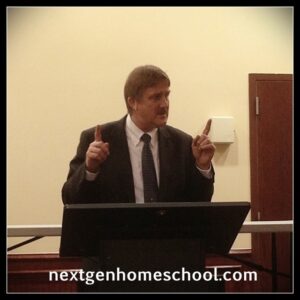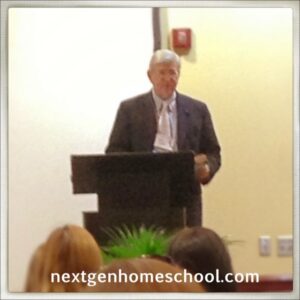Welcome to NextGen Homeschool’s Homeschool Conventions 2013 Series! This year the authors of NextGen Homeschool are covering several conferences all across the country, and we’ll be posting on the experience, the curriculum news, and the big-picture issues discussed at each conference. We’ve also posted a wonderful planning tutorial — Homeschool Conventions 101: How to Plan — to help you prepare for attending your own homeschool conference.

Homeschool Conventions, Part 2: OCHEC Tulsa — The Speakers
This year I took the pressure off of the many choices between speakers and topics by pre-ordering the whole convention on mp3. That way I could enjoy the experience of hearing each speaker, knowing that I’d be able to go back and note more details after the convention.
Andrew Pudewa, Institute for Excellence in Writing
For the first regular session, I chose to go to Andrew Pudewa’s session “Mastery Learning, Ability, Development & Individualized Education,” while my mom and sister went to “Making Brothers & Sisters Best Friends” by the Mally’s. I always go to at least one of Mr. Pudewa’s sessions because he is a great speaker and I always learn something. I am so glad I ordered the mp3s. Mr. Pudewa’s session was one that needs to be listened to over and over again until it truly sinks in.
 He talked about Suzuki’s method of teaching violin and how that method could be used to teach anything. Mastery is key to ability. Don’t move on until a child has mastered the lesson. And keep each previous lesson in the repertoire. This requires patience and consistency. The four pillars of the Suzuki method are:
He talked about Suzuki’s method of teaching violin and how that method could be used to teach anything. Mastery is key to ability. Don’t move on until a child has mastered the lesson. And keep each previous lesson in the repertoire. This requires patience and consistency. The four pillars of the Suzuki method are:
- Start at a young age
- Create the right environment
- Parents are the best teachers
- Use the right methodology
The first session of Mr. Pudewa’s that I ever attended was about the difference between teaching boys and girls. It was truly eye opening and spot on. As many of you know, I have finished homeschooling our two girls and just started teaching the first of our two boys. I have listened to that session several times in the two years since I first heard it.
I also attended Mr. Pudewa’s session on “The Four Deadly Errors of Teaching Writing” at the end of the day. Once again, I took a bunch of notes, but I know that I will have to go back and listen to the mp3 recording I ordered several times to really get it. Here are the four errors in a nutshell:
- Over-correcting
- Withholding help
- Unclear assignments
- Over-expectation
One thing Mr. Pudewa said that I thought was humorous was that red ink wasn’t allowed in schools anymore because the color was too violent.
Diana Waring, Diana Waring Presents
The second session Liz and I went to was Diana Waring’s “History Via the Scenic Route,” while my mom went to “Irresistable Parenting” with Todd Wilson. Elizabeth and I use Diana Waring’s History curriculum almost every year, and we love it. Next year we will used her Romans, Reformers, and Revolutionaries (Middle Ages) curriculum. We love her unit studies, which are centered around her audio lectures and stories. It was great to put a face with the voice. We both thoroughly enjoyed listening to her and are very motivated for next year’s history studies!
A couple of tidbits I wrote down from her session: History is everything that has ever happened, find something to “hook” the child by making connections between disciplines, and use all five senses to really learn and remember a story. Something that I have always loved about Diana Waring is that she always brings it back to how history is “His Story” – God works throughout history, and He didn’t stop after the Bible was written. She told the story of the “Miracle of Dunkirk” and once again, I found myself tearing up — I do every time I read or hear that story.
Joanne Calderwood, Author & Speaker
For the third session Elizabeth and I went to Joanne Calderwood’s Self-Teaching 101 Part 2 (yes, we missed part 1). I was familiar with Joanne Calderwood’s name through the planner she created for self-teaching students several years ago. Mrs. Calderwood has eight children, and through some struggles of her own, she discovered the power of self-teaching — teaching your children to take ownership of their own education. The results are amazing in her family and in other families I have seen use the self-teaching method.
Honestly, this method would have worked well, and actually kind of did, for me as a student. My mom gave us our assignments then let us go at our own pace. I did well this way because I was already a self-motivated student. I loved to get my school work done at my own time and own pace, and then I spent the rest of my time reading.
But I have found as a homeschool mother that I actually enjoy teaching my children most of the time. I enjoy doing history unit studies. I hope to implement some of the independent self-motivated methodology in other areas of school, such as math, reading and science.
I enjoyed listening to Mrs. Calderwood and learned a few things from her: Many homeschool mothers are “helicopter homeschooling,” we should instill a “yes I can” attitude in our kids, self learning is a gift, and our job as parents is to work ourselves out of a job.
J. Michael Smith, HSLDA
On Wednesday morning we all went to hear J. Michael Smith “Homeschooling & Parental Rights-Freedom Under Fire.” Homeschool freedom hinges on two fundamental rights: Religious rights and parental rights. There are two major supreme court cases that set the precedent for this. Pearce v. Society of Sisters 1925, which said, “Children are not a mere creature of the state.” Parents have a fundamental constitutional right to direct the upbringing and education of their children. The second is Wisconsin v. Yoders, which tested the three tenet law — public school, private school or other means — and said the state’s interest is that each student is literate and self sufficient. It upheld the religious freedom to homeschool.
 Mr. Smith gave us a short list of future threats to homeschool freedom. This includes: the current generation of homeschoolers who are not familiar with the battle for freedom, the fact that we have a tendency to let things rest (we think someone else will will do it), and biggest threat of all is that so many are going the virtual online school route, which is nothing more than public school at home. And he left us with this thought: Public education is mostly about indoctrination, not education.
Mr. Smith gave us a short list of future threats to homeschool freedom. This includes: the current generation of homeschoolers who are not familiar with the battle for freedom, the fact that we have a tendency to let things rest (we think someone else will will do it), and biggest threat of all is that so many are going the virtual online school route, which is nothing more than public school at home. And he left us with this thought: Public education is mostly about indoctrination, not education.
The third session we all went to was “The Power and Praise with Our Children,” also with J. Michael Smith. This was a great reminder of how we should and should not talk to our children. We should remember to be more positive than negative with our children. He used James 3:1-10 as a basis and also quoted Proverbs 19:11 and James 1:26. We should always remember to use our tongues to bless — SPEAK LIFE!
Continuing Education Post-Convention
It will be several weeks before I receive the complete convention on mp3, but it will be great to have the opportunity to listen to all of the workshops that I missed at my leisure. Some of the ones that sounded interesting but conflicted with other workshops were:
- “Creative, Flexible Home Organizing” with Barb Shelton of Homeschool Oasis
- “If Mary & Martha Had Been Homeschool Moms” and “Self-Teaching 101 Part One” with Joanne Calderwood
- “Organize This” with Tracy Phillips of OCHEC
- “But…but…but…What About Grammar?” with Andrew Pudewa
- “Box Free Living” with Diana Waring
If you can’t make it to a homeschool convention, I highly recommend that you order some convention audios. Although you will miss the environment, you will still receive the information and encouragement.
If you have attended a homeschool convention this year or in the past, who are some of your favorite speakers? What messages of encouragement or inspiration have stuck with you? If you haven’t attended before, have you heard homeschool speakers share in other venues or read their books or blogs?

